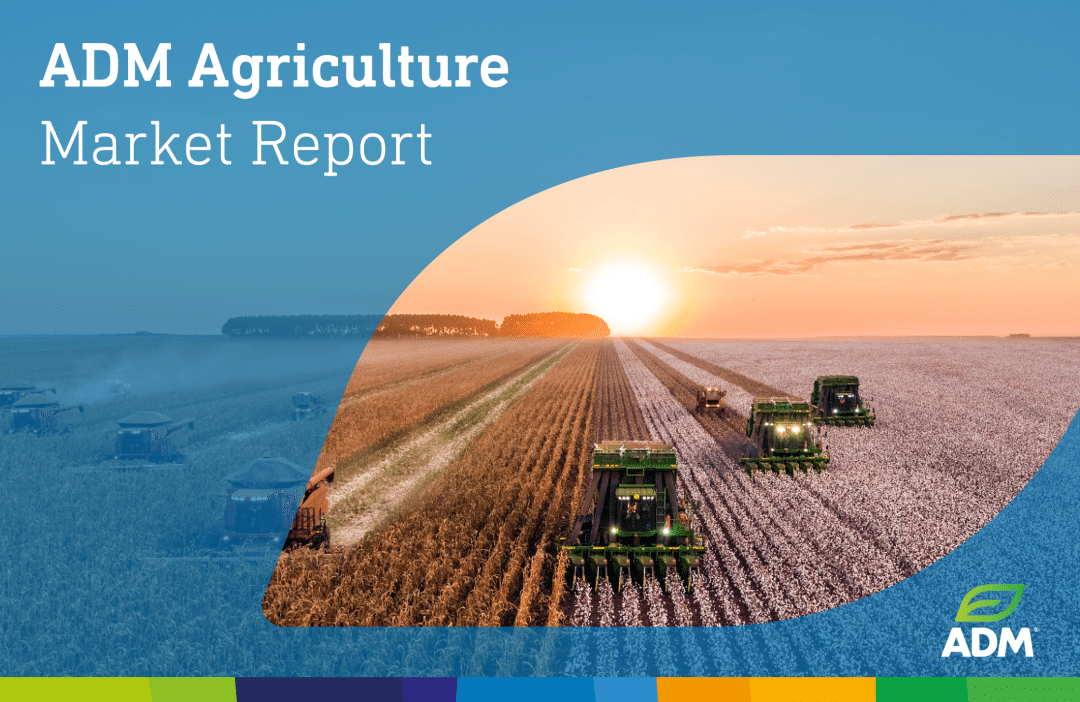WELCOME TO THE ADM AGRICULTURE WEEKLY MARKET REPORT
The deadline for crop 24 Re:Generations contracts is 29 February. Watch our latest YouTube video here for information on how the programme supports growers in implementing regen agricultural practices on the ground.
Wheat
- Despite the technical bounce earlier in the week, Chicago has traded down 5c/bushel, or $1.83/t, week on week.
- After initially establishing fresh contract lows, prices surged higher on technical buying. News supporting the rally wasn’t apparent, and given the fact US supplies are not competitive, the move higher saw the market eventually run out of buyers.
- US weekly exports were again at the high end of the range, with for the second consecutive week, China appearing in the shipping rundown, but overall shipments are still seen 17.5% lower y/y and currently sit at 61.3% of the yearly projection.
- European prices have also weakened, trading down €5.25/t w/w. Talk of higher inventories in France, based on lower domestic demand and exports, are now seen at their highest level since the 2018-19 season. Continued aggressive pricing from the Black Sea region is keeping EU prices in check, with reports that Russian wheat exports could reach 52.9mln t this season, up from a previous estimate of 50.4mln t. While technical issues continue to disrupt official data released by the EU Commission, the latest release (up to 13th February) showed that soft-wheat exports had risen to 19.9mln t, down just 4% y/y, with wheat exports to China now reported as being almost 1.2mln t.
- The UK market continues to decline, down £3.10/t w/w, although as futures lower, the physical delivery premiums have widened. Market dynamics remain one of pulling wheat from the south and east, into the more deficit northern and western regions, with the flow of fresh farm supplies just about accounting for the slow consumption offtake and limited buying activity.
Malting Barley
- We have had another week of close to zero demand for old crop malting barley as coverage remains good, today at least, for the remainder of the season, and offered prices continue to march lower as a result. Premiums remain at very attractive levels and feed markets are lower week on week.
- New crop remains similarly inactive and prices continue to fall across the continent under heavy production estimates, however, weather conditions are sub-optimal as we enter the key planting period for the UK and France, with rains stopping play. Once again, all eyes will be on the weather for the next few weeks, and we don’t see markets selling off much further in the short term, at least until conditions improve.
Feed Barley
- Feed barley prices are lower on the week, however, we have found some support in recent days on firmer futures and a lack of farmer selling. The slow export pace and lack of demand still pose a threat to old crop prices in the medium term, however.
- We have seen small quantities of export demand take place, which has helped to offer some support to the market, but still we see cheap corn offers in export destinations which is undermining feed barley demand.
- New crop activity has picked up with domestic consumers showing some interest at today’s lower prices. However, we have a good exportable surplus on paper heading into the next harvest, and we are currently nowhere near pricing into export demand.
Rapeseed
- Soybeans are lower again this week, continuing the downward trend, as the South American harvest progress, alongside weak demand, continues to add pressure to ag markets. We have seen spells of price positivity throughout the week, as yields in Brazil continue to disappoint, leading to further reductions in crop expectations, with the majority now sitting around 145-149mln t (vs USDA’s last report at 156mln t). In Argentina, we have also seen reductions in crop production figures following the recent heatwave. This week, COAMO has reported carryover soy, corn, and wheat stocks 50% higher than this time last year, as supplies from last year’s bumper crop remain and farmer selling is slow. Due to current low prices, farmers are thought to have sold 10% in Brazil vs 30-40% seasonally by this time of year.
- Energy markets have been mixed this week, as a large jump in year-over-year EIA crude oil stocks deficit capped any significant gains. We also saw news that Russia’s February crude oil exports from its western ports were 2.1 million barrels per day, offsetting previous concerns about higher supply flow. However, private forecasts have said that commercial oil inventories will increase by 5 million barrels, and this week’s Reuters poll predicts a 4.3 million barrel build in EIA crude oil stocks. Saudi crude exports dipped in December after three months of increases. December exports were 6.308 million barrels per day, 0.4% lower from 6.336 million barrels per day in November.
- Veg oils are lower this week as reports that China plans to increase oilseeds production added pressure. NOPA soy crush marked the highest January on record as US crushers have extended their capacity to cope with larger veg oils demand.
- Canola is lower this week as farmers still struggle to catch up with the seasonal selling pace. Farmer deliveries are still expected to be 2mln t behind the five-year average pace. China has returned to the market this week following the Chinese New Year and has stepped in to purchase 6-7 cargoes of canola for April-May delivery. This wasn’t enough to keep the Winnipeg canola/MATIF rapeseed spread contained, as canola is losing value in comparison to the EU to gain competitiveness. Currently, canola is at a $30-$35 discount and will need to get to circa $50 to get into the EU.
- MATIF rapeseed is also lower this week after running into resistance at €430 again, which is proving to be strong. In the EU, crush margins favour soy for the remainder of this crop year and there is still plenty of rapeseed that will need to find a home. This is the case in the UK, as well as farmer selling being behind the seasonal pace. Some have taken the opportunity to cash out recently, as prices have reached the lower end of some targets.
- Sterling trades at 1.16700 which has slightly supported UK prices.
Pulses
- The ongoing import duty situation in India continues to drive the market direction for peas. Imported and domestic values continue to rise week on week, particularly for green (large blue) peas, resulting in some growers continuing to hold in case of firmer values in the coming weeks. Risk, of course, comes with that, as there will come a time where India has filled that demand and there could be exportable surpluses in major exporting origins.
- Feed peas are in strong demand domestically for Q1/Q2, with some consumers already looking towards new crop cover. Prices have sharpened slightly week on week, and we would be keen buyers of any open market feed options, with swift movement opportunities available.
- Our 2024/25 buybacks are close to being filled. Please get in touch with your farm trader to understand more about the fantastic gross margin opportunity peas provide, as well as prices and details of the buybacks! Large blue pea seed is now very thin, Kabuki is being booked strongly, and demand for yellows increasing! We have great movement opportunities still available.
Seed
- Spring cereal seed is largely sold out across the board. If you are still looking to cover spring seed requirements, we have Kabuki marrowfat pea seed available alongside our market-leading buybacks. We also have a large portfolio of Maize varieties available to suit Grain, Forage, and AD.
- As we begin to look toward the 2024 autumn drilling campaign, there are some excellent varieties to choose from. Including newly recommended Group 3 soft wheat Bamford, which looks set to reinvigorate the Group 3 market, yielding on par with the highest-yielding feed wheats and boasting the best Septoria resistance across all recommended soft wheats.
- We would advise those planning their rotations to cover seed requirements sooner rather than later for autumn drilling. Due to extreme weather conditions causing issues with autumn 2023 drilling, seed crop area and yields are predicted to be down, therefore we expect seed supply to be limited across all mainstream varieties this coming year.
Fertiliser
- Granular urea has edged marginally lower this week, after hitting highs of $410/t FOB Egypt, trading $4/t lower for a small cargo for March shipment.
- Pricing for CF 34.5% Nitram, produced in the UK, remains unchanged, but delivery options now stand as April and May only.
- Imported AN is still available for immediate delivery, although straight urea is still the cheapest nitrogen on a cost-per-unit of N basis.
- With the new regulations coming into force on 1st April, interest in granular urea plus an inhibiter continues to attract a lot of attention. We have product available for delivery Feb, March or April.
- India tendered for 50kmt of DAP this week, which could see some new global pricing for the 18N 46P product.
- We have straight products available such as MOP, TSP, and DAP, alongside sulphur products such as Polysulphate and Kieserite, for immediate delivery.
- Liquid UAN and UAN + ATS grades remain available for spring delivery at the buyer’s call. Please speak to your ADM farm trader for delivery lead times and pricing.
| £/€ | £/$ | €/$ |
|---|---|---|
| 1.1670 | 1.2620 | 1.0815 |
| Feed Barley £ | Wheat £ | Beans £ | Oilseed Rape £ | |
|---|---|---|---|---|
| March 24 | 130-145 | 154-169 | 240-245 | 345-350 |
NB: Prices quoted are indicative only at the time of going to press and subject to location and quality.
“Although ADM Agriculture take steps to ensure the validity of all information contained within the ADM Agriculture Market Report, it makes no warranty as to the accuracy or completeness of such information. ADM Agriculture will have no liability or responsibility for the information or any action or failure to act based upon such information.”
ADM Agriculture cannot accept liability arising from errors or omissions in this publication.
ADM Agriculture trade under AIC contracts which incorporate the arbitration clause.
Terms and Conditions of Purchase.
On every occasion, without exception, grain and pulses will be bought by incorporating by reference the terms & conditions of the AIC No.1 Grain and Peas or Beans contract applicable on the date of the transaction. Also, we will always, and without exception, buy oilseed rape and linseed by incorporating by reference the terms & conditions of the respective terms of the FOSFA 26A and the FOSFA 9A contracts applicable on the date of the transaction. It is a condition of all such transactions that the seller is deemed to know, accept and understand the terms and conditions of each of the above contracts.



